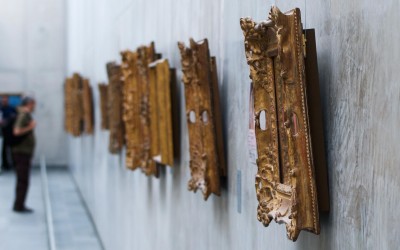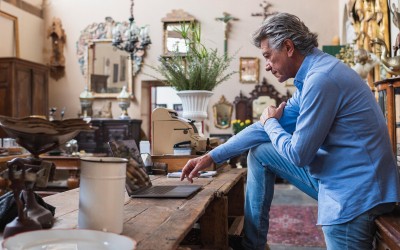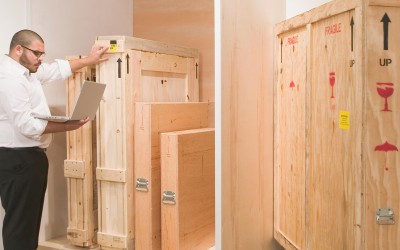Art dealer Sebastian Vogel turned his passion into his work. The former creative director founded his online gallery VogelART in Munich a few years ago. He specialises in art editions. We talked to him about what customers want, market potential, and the uniqueness of reproductions.
ERGO: Sebastian, you would like to make high quality art available to as wide a public as possible. Who are we talking about here? What customers tend to visit your gallery?
Sebastian Vogel: Typically, our customers are between 30 and 50 years old and very digital-savvy. Many of them are just starting out in their careers or are setting up home together for the first time with their partner. And they are not just scouting around for cool furniture – they are also interested in beautiful art. Most of our customers are genuinely interested in art and have high expectations of artistic quality – yet do not feel that a classic art gallery is for them. Often, they simply lack the time to visit galleries. So, in this case, an online gallery is the optimum solution.
ERGO: How do your customers differ from other art collectors?
Sebastian Vogel: There’s no short answer to that question. The art world is pretty elitist and often conservative. You find the same select coterie going to the same events. Outsiders are not welcome. Our customers are different – they are more open and eager to experiment than your traditional art collector. This may well be because they lack the connections in the art business. Traditional galleries, for example, focus on art fairs. Fairs are like a microcosm – a very homogeneous scene celebrating itself. And one to which my customers often feel they do not belong. As I said, it’s a small exclusive world that wants to stay that way. Invisible barriers are created and, as a result, a huge market is left wanting. There are a lot of people out there who want to buy high-quality art. In this respect, the way we do business taps into a completely new target audience. And business is not confined to our online shop. We regularly set up pop-up galleries – in Düsseldorf, Berlin, Vienna, in city centres. ERGO has often been on board as a partner at these events. And we see the same thing every time. Pop-up galleries attract a completely different audience to that of classic art fairs.
ERGO: Do your customers tend to be experienced art collectors or are they mainly people who have just discovered a passion for collecting?
Sebastian Vogel: Both, really. Some of our customers already own large collections and know a huge amount about art. Many of our customers, though, are buying an artwork for the first time, starting out, so to speak. We reach them via our website – or our showroom in Munich, which we intentionally kept low-key. You won’t find a typical white cube presentation there, in fact artworks are often just propped up on the floor. There is also no artificial light in the showroom – we want people to feel at ease and not to be put off from coming in.
ERGO: You sell limited editions. How significant are editions in attracting new target audiences?
Sebastian Vogel: Very significant. Editions are an affordable way of owning the works of a favourite artist for people who cannot pay five, ten or fifty thousand euros for a work of art. We develop limited editions with the artists – and sell them at prices that almost everyone can afford. An important aspect for us is to keep editions as small as possible, to not more than 30 prints. These 30 works are then individualised by the artist. Take, for example, Jan Albers, a Düsseldorf artist. He produced a sculpture for us in a limited edition of 25, each in a different colour, so every single one is a unique work of art. And, at the same time, absolutely affordable. That is our philosophy in a nutshell: to offer great art at a fair price, thus enabling more art lovers to buy high quality art that is within their means.
“Our customers are different – they are more open and eager to experiment than your traditional art collector.”

ERGO: How do editions with artists come about? Do artists have to fulfil specific criteria?
Sebastian Vogel: The artists whom we work with have to meet three criteria. Firstly, they have to have works in museums or in large collections, purchased specially for the purpose. Secondly, they have to be living, since this is only way for customers to get to know them, follow their development and grow with them. Thirdly, and lastly, artists have to be industrious. They have to do exhibitions, post regularly on Instagram, etc.
ERGO: How do you come to work with artists on an edition?
Sebastian Vogel: If the artist is right for us, we get to know them better and discuss what might be a suitable subject for an edition. We look at the artist’s “DNA” and ask ourselves: What is special about their work? Which methods or techniques can be used in the edition? Then we try things out together, experiment, make dummies, and at some point or other, we hit on the idea for the edition – you could call it an epiphany moment. The upshot is a completely new work, but one that has the potential to be reproduced.
ERGO: Some of the editions you sell are in a different price bracket to the art hanging in traditional galleries. Art therefore becomes more affordable for a greater number of art lovers, something akin to a democratisation of the art market. What role does price play in this democratising process?
Sebastian Vogel: The price, of course, is a decisive factor. Most of our works sell for between 500 and 3,000 euros. And as you noted, these are prices everyone can afford. And if not, we also offer straightforward instalment plans. Another option is to hire your art – and, if you like, convert the hire fees into a deposit. At any rate, we put a lot of thought into making good art accessible to more people. And fair prices, limited editions and online selling have certainly proved a successful way of doing so for us.
ERGO: Our last question smacks of heresy. Does democratising art not inevitably result in its devaluation?
Sebastian Vogel: No, I don’t think so. As long as you take a few criteria into account. Quantity, for instance, is important to editions. If the edition is small, both sides benefit in the end, the artist and the buyer. The artist, because the edition makes them more famous. And the buyer, because they now own a unique edition by an artist who is becomingly increasingly well-known.
ERGO: Sebastian, thank you very much talking to us.


“A collection worthy of a museum: the ERGO Corporate Collection”
Franz-Josef Krebber is a passionate art lover and connoisseur, as well as the custodian of more than 3,100 works of art.
More information
“Precious booty, fleeing robbers – and the insurers on their heels”
The burglaries of an ingenious, not to mention charming, jewel thief with a spectacular chase across the rooftops of Nice makes for great entertainment on the cinema screen.
More information
“ERGO designs the first children’s gaming website for the Kunstpalast Museum.”
In 2019, the Düsseldorf Kunstpalast was the first museum in Germany to launch an interactive website for children.
More informationWhat is your
passion?
All our expertise for your passion
Do you have any questions about products, services or bespoke insurance? We will be happy to advise you:
Write us!





